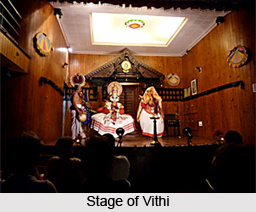 Vithi is one of the major play forms in Indian Drama. Vithi is basically the solo form of Sanskrit theatre. The literal meaning of vithi is `road` or `way`. Studies on vithi have appeared from time to time in research journals but there is no inclusive study on the form on comparative basis. It represented one character who, by means of akasabhashita suggested the sringara i.e. erotic rasa, and other rasas to some degree. Different kinds of sentiments are woven in its texture and the hero can be morally any of the three types which include uttama i.e. excellent, madhyama i.e. medium and adhama i.e. bad. This solo form of theatre extensively used kaisiki or graceful vritti and employed thirteen essential elements, as follows:
Vithi is one of the major play forms in Indian Drama. Vithi is basically the solo form of Sanskrit theatre. The literal meaning of vithi is `road` or `way`. Studies on vithi have appeared from time to time in research journals but there is no inclusive study on the form on comparative basis. It represented one character who, by means of akasabhashita suggested the sringara i.e. erotic rasa, and other rasas to some degree. Different kinds of sentiments are woven in its texture and the hero can be morally any of the three types which include uttama i.e. excellent, madhyama i.e. medium and adhama i.e. bad. This solo form of theatre extensively used kaisiki or graceful vritti and employed thirteen essential elements, as follows:
Udghatyaka: When having heard some words and not understood their sense, the character adds some of his own to make a meaning out of them.
Avalagita: When parallel stage business such as hinting of the hero`s entry is performed in unison.
Prapanca: A conversation exciting laughter.
Trigata: Deriving more than one meaning from words, leading to laughter.
Chala: Deception by words apparently friendly but inimical in reality.
Vakkeli: It is a passage exciting laughter by means of two or three rejoinders. According to others, it defines breaking off a speech before its sense is complete, or a single answer to a variety of questions.
Adhibala: This is an interlocution of high words in mutual defiance.
Ganda: A hurried or sudden speech causally connected with a matter in hand, though having a different significance having no intended reference to what it chances to be connected with.
Avasyandita: This is an interpretation of a speech contrary to the sense in which it was first spoken.
Nalika: This is enigma associated with pleasantry. Its being attended with a joke distinguishes it from avasyandita.
Asatpralapa: This is incoherent or nonsensical talk, as by a mad person or when one awakes from sleep.
Vyahara: These are words spoken giving rise to laughter in the hero.
Mridava: When faults turn into merit or merits into faults.
These above mentioned elements occurred in nataka, bhana, and other forms, but derived from vithi, which proves its significance.




